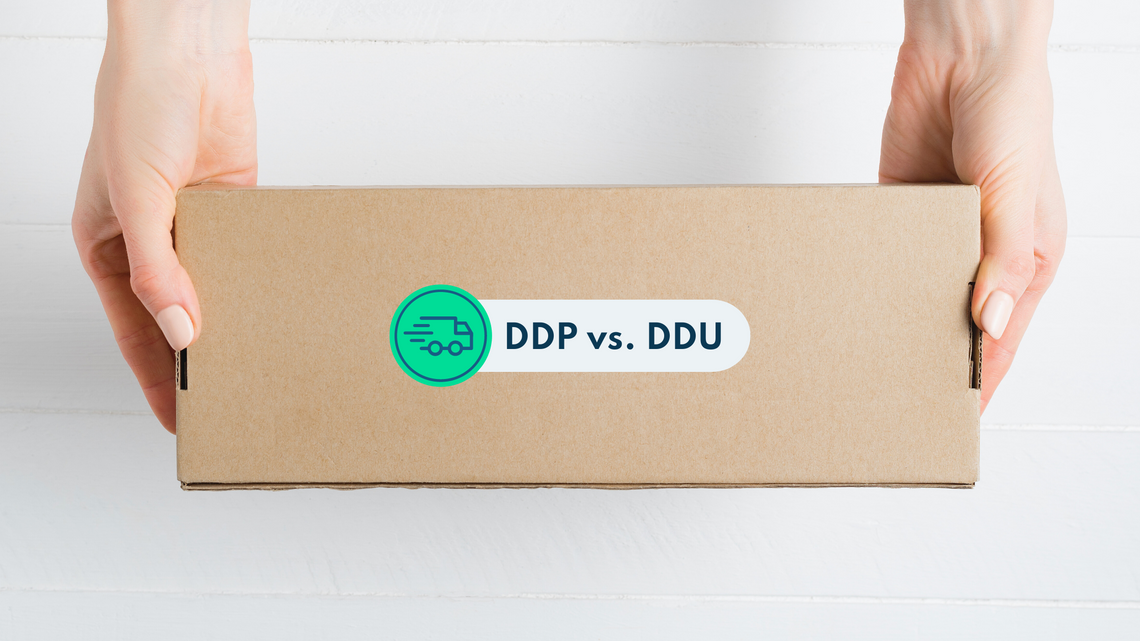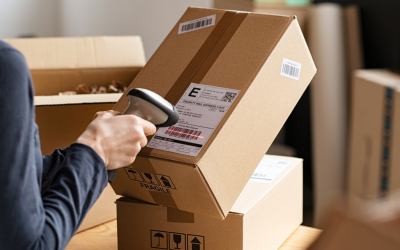Whether you’re a seasoned global seller or just starting to explore international e-commerce, familiarizing yourself with Delivered Duty Unpaid (DDU) and Delivered Duty Paid (DDP) shipping is vital. These terms directly impact your operational processes, compliance with trade regulations, and customer experiences. In this article, we’ll provide an overview of DDU and DDP, how they differ, and the implications of each in a brand’s shipping strategy.
Understanding DDU and DDP Shipping Terms
Before comparing DDP vs. DDU, e-commerce merchants shipping internationally need to grasp the fundamentals of these two billing terms. A thorough understanding of DDU and DDP enables businesses to navigate international logistics with confidence, ensuring smoother transactions for both sellers and buyers.
Delivered Duty Unpaid (DDU):
When opting for DDU shipping, a customer initially pays only for shipping at checkout and is then required to settle any assessed duties and taxes upon importation to receive their shipment. Some carriers will hold the shipment until all fees are paid and others will collect the fees on delivery. Notably, delays in payment can lead to orders being held at customs or returned undelivered. It’s crucial for sellers to clearly communicate with buyers when using DDU billing terms to avoid unexpected costs or customs holds.
Delivered Duty Paid (DDP):
Conversely, with DDP shipping, consumers pay for shipping as well as any applicable duties and taxes at the point of sale. This more streamlined approach means the seller assumes all responsibilities and expenses associated with transporting goods right to the buyer’s doorstep, including settlement of import duties, taxes, and other related charges. While upfront costs may be higher for customers, shipping on DDP billing terms ensures a more seamless delivery experience and eliminates any surprise fees or potential holdups.
Keep in mind, sellers utilizing DDP shipping must have a solid understanding of the import regulations and tax requirements of their target markets to effectively manage the additional responsibilities and costs.
However, it’s important to clarify that Incoterms – associated with commercial (B2B) shipments – often don’t apply to e-commerce companies shipping directly to consumers. Instead, small package carriers use DDU and DDP as “billing terms” to define who’s responsible for paying duties and taxes. Confusing freight-specific Incoterms with billing terms for smaller shipments can lead to misinterpretations, like when brands are required to register for tax IDs in the destination country.
Comparing DDP vs. DDU for International Shipments
Both DDP and DDU shipping come with their own set of advantages and considerations, impacting cost, control, and overall consumer satisfaction. While DDU can offer simplicity and lower initial costs, DDP is typically recommended for its ability to provide a superior customer experience. It ensures that your buyers aren’t faced with any unforeseen expenses or delays, fostering trust and reliability in your brand.
DDP is particularly beneficial for shipping high-value items to markets with strict customs regulations. It not only streamlines the shipping process, but also ensures price transparency and predictability for your customers. DDU, on the other hand, is often utilized for lower-value products or in countries with negligible import duties and taxes. Though this option can appear more cost-effective, it demands clear messaging to avoid any unpleasant surprises.
| DDP International Shipping | DDU International Shipping |
|---|---|
| Customer pays shipping cost plus duties and taxes at checkout | Customer only pays shipping cost at checkout |
| Seller is responsible for settling duties and taxes on import | Buyer is responsible for settling duties and taxes on import |
| Higher upfront costs for consumers | Lower upfront costs for consumers |
| Eliminates unexpected fees and delays due to customs and carrier holds | May cause unexpected fees and delays due to customs and carrier holds |
| Offers a more seamless experience | Requires transparent communication |
Choosing the Best International Shipping Strategy
There’s no one-size-fits-all answer when choosing between DDP vs. DDU delivery options. Your brand’s shipping strategy should take into account various factors such as the product type, value, and desired buyer experience. For businesses prioritizing customer satisfaction, DDP provides a smoother delivery process. In contrast, if your focus is keeping initial costs down and items are of relatively lower value, DDU might be the more suitable choice. Partnering with an experienced international solutions provider like Passport offers invaluable insights and can help you navigate complex global markets. Leveraging our internationalization technology, logistics services, and industry expertise, we’re here to help you build a shipping strategy that not only aligns with your brand’s objectives, but also resonates with your customers’ expectations. To get started, reach out to the Passport team here.
Frequently Asked Questions
What does DDP mean in international shipping?
In international shipping, DDP (Delivered Duty Paid) means the consumer pays for the product, shipping, duties, and taxes all at checkout. The seller then handles these costs and ensures the goods are delivered without any additional fees or customs procedures for the buyer.
What does DDU mean in international shipping?
In international shipping, DDU (Delivered Duty Unpaid) means the consumer pays for the product and shipping costs at checkout. However, the buyer is responsible for paying any duties and taxes upon arrival of the goods in the destination country, often leading to potential delays in receiving their shipment.
Who pays customs clearance for DDP?
For DDP (Delivered Duty Paid) shipping, the seller is responsible for paying any customs clearance fees in the destination country.
Who pays customs clearance for DDU?
For DDU (Delivered Duty Unpaid), the buyer is responsible for paying any customs clearance fees upon import to receive their shipment in the destination country.
What is the difference between DDU and DDP?
DDU (Delivered Duty Unpaid) requires the buyer to pay for any duties and taxes upon arrival in the destination country, while DDP (Delivered Duty Paid) places the responsibility on the seller to settle duties and taxes, ensuring a seamless delivery without unexpected fees.
Is DDP better than DDU?
DDP shipping ensures a smooth and transparent customer experience by handling all costs upfront, eliminating surprise fees and customs delays. While DDU offers lower initial costs, it places the responsibility of handling duties and taxes on the buyer, potentially leading to unexpected fees and complications. Opting for DDP generally aligns with prioritizing a better customer experience.
Should I use DDP or DDU?
The choice between offering DDP or DDU shipping should be based on your business’s priorities. If you want to provide a seamless, transparent experience for your buyers, DDP is preferable as it covers all fees and responsibilities upfront. However, if your focus is on minimizing initial costs and your customer base is well-informed about potential duties and taxes, DDU could be a suitable option.




